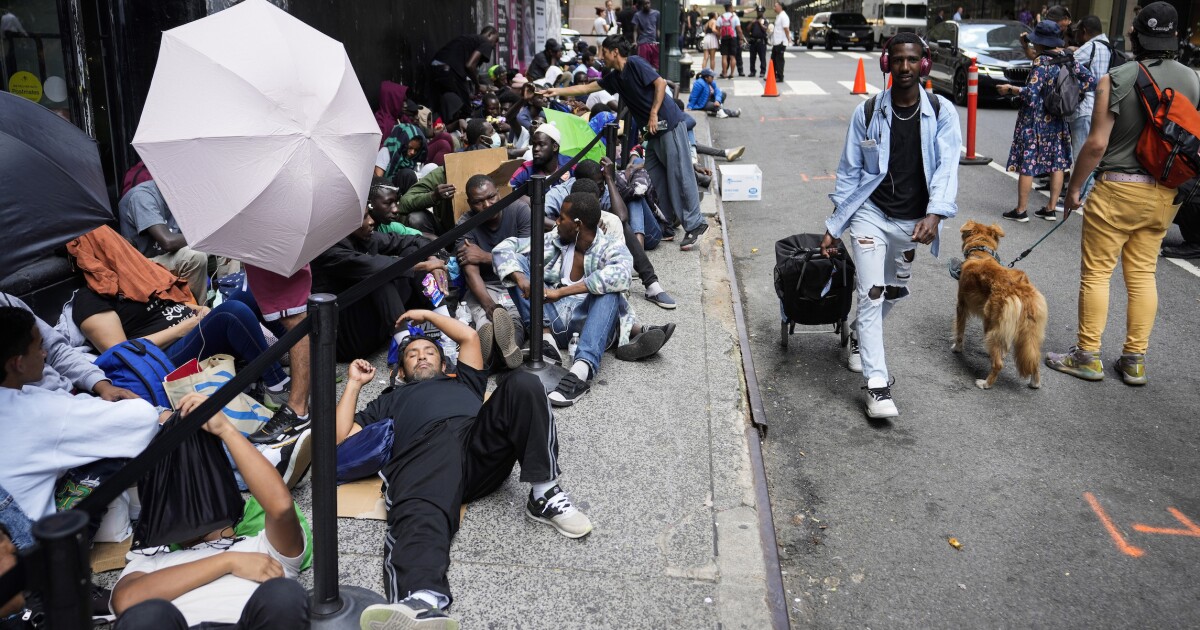

Democratic politicians are not rolling back the welcome mat to immigrants despite the toll the surge of border crossers has taken on cities and states.
More than 2 million immigrants have been released into the United States from the southern border since 2021, and many have chosen to move to immigrant-friendly cities up north. The influx of arrivals to cities including New York City, Chicago, and Washington has led the blue cities to call in, even demand, federal assistance, but their open-arm welcome has not quite diminished despite the hardships.
HAWAII FIRE: FIREFIGHTERS DROP 150,000 GALLONS OF WATER AS FIRE DEVASTATES ISLANDS
An aide to New York City Mayor Eric Adams said the five boroughs have received requests for shelter from just shy of 100,000 immigrants over the past year.
“We are providing them with services while Governor Abbott cruelly ordered children pushed into the Rio Grande. There is no comparison,” the Adams administration aide wrote in an email.
Greg Abbott, the three-term GOP governor from Texas, began providing free bus rides to Chicago, New York City, and Washington in early 2022. The move was twofold — to alleviate pressure on Texas border communities facing several thousand new people on its streets daily and a political stunt that he said targeted “sanctuary” cities.
Hundreds of localities have adopted sanctuary policies over the past decade. The term generally refers to a local jurisdiction that will not work with federal immigration officers. For example, the New York Police Department will not detain an illegal immigrant arrested and jailed in New York City to transfer to U.S. Immigration and Customs Enforcement.
Someone released from the border with documents allowing them to remain in the country through their court proceedings for illegal entry is already protected from deportation.
“These are two completely different things,” said Theresa Cardinal Brown, senior adviser for immigration and border policy at the nonpartisan Bipartisan Policy Center think tank. “Sanctuary policy is different from an attitude of welcome.”
Adams’s office said immigrants released into the U.S. have documents and thus would not need to seek out a sanctuary city despite Abbott’s claim.
“This has nothing to do with sanctuary cities despite how many lies Governor Abbott tells,” the Adams aide said. “These individuals have been paroled into the U.S. by Customs and Border Protection, so they are not undocumented immigrants. They literally have documents. That’s how many have arrived from the border via plane.”
Instead, immigrants have chosen to travel to large cities for jobs, family or friend connections, and, theoretically, an abundance of resources. District of Columbia Councilman At-Large Robert C. White Jr. doesn’t think cities like Washington have overpromised or underperformed.
“Most migrants arriving to the border probably have no idea what [sanctuary] means,” Brown said. “They’re looking to settle in a place that has jobs. They all want to work, or maybe they’re going to a place where they know where [other people from their country] have gone and found jobs.”
But it has put the cities in a bind. New York City, Chicago, Washington, and New York state all declared emergencies in the past year. Massachusetts became the latest to declare an emergency and pleaded with the federal government for assistance.
New York City has a law on the books that requires the city to provide same-night shelter to homeless families who arrive at a shelter before 10 p.m. But Adams has walked back the city’s own commitment because too many people have shown up from the border.
“That is just not sustainable. It’s not realistic. … That’s not fair to New York City residents,” Adams said.
White agreed that elected officials in both cities want to help but can only do so much.
“It’s not that the District has offered too many resources, but rather that we need assistance from the federal government in the way of financial resources, help with housing, and work permits,” White said in an email. “No jurisdiction can manage international migration by itself, but collectively we can do better.”
But the cities have been more than just welcoming, according to some critics. Some have passed initiatives to give noncitizens driver’s licenses, in-state tuition, healthcare benefits, and food and housing assistance.
Still, attorney Evangeline Chan, director of the immigration law project at New York City-based nonprofit group Safe Horizon, said she has not seen the city waver despite the challenges the city has faced.
“Yes, there are very real logistical challenges; it comes down to funding and coordination to be able to provide resources that address the basic and legal needs of the thousands of new arrivals we are seeing each month,” Chan wrote in an email. “But I do see a lot of people coming together to do their part to help and rising to meet the challenge, including nonprofits, community-based organizations, the private bar, and members of our community.”
Republicans like Abbott and Gov. Ron DeSantis (R-FL) have said liberal localities’ laws that provide driver’s licenses, in-state tuition, healthcare benefits, and food assistance are incentives to newcomers.
However, Chicago Alderman Nicholas Sposato laid full blame for the city’s problems at President Joe Biden’s feet for what he said was no federal plan to help people find long-term housing and obtain work permits.
CLICK HERE TO READ MORE FROM THE WASHINGTON EXAMINER
“I blame everything on the president because there’s been no plan,” Sposato said in a phone call Friday evening. “I’m sure 95%, at least 99% are here to make a better life for their family and want to work, but they’re just sitting around in schools and in our houses and hotels doing absolutely nothing.”
“You’re even seeing liberal cities like New York and Massachusetts say, ‘We can’t take any more.’ Chicago has yet to say that,” he added, “but at some point — I mean, we have 1,129 people as of yesterday [living] at police stations.”




